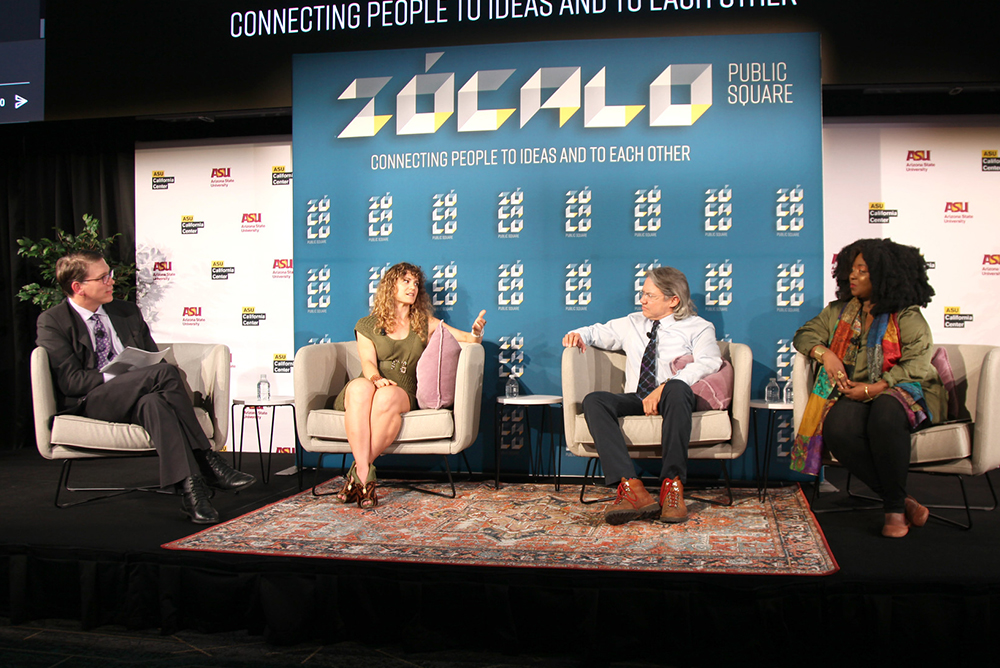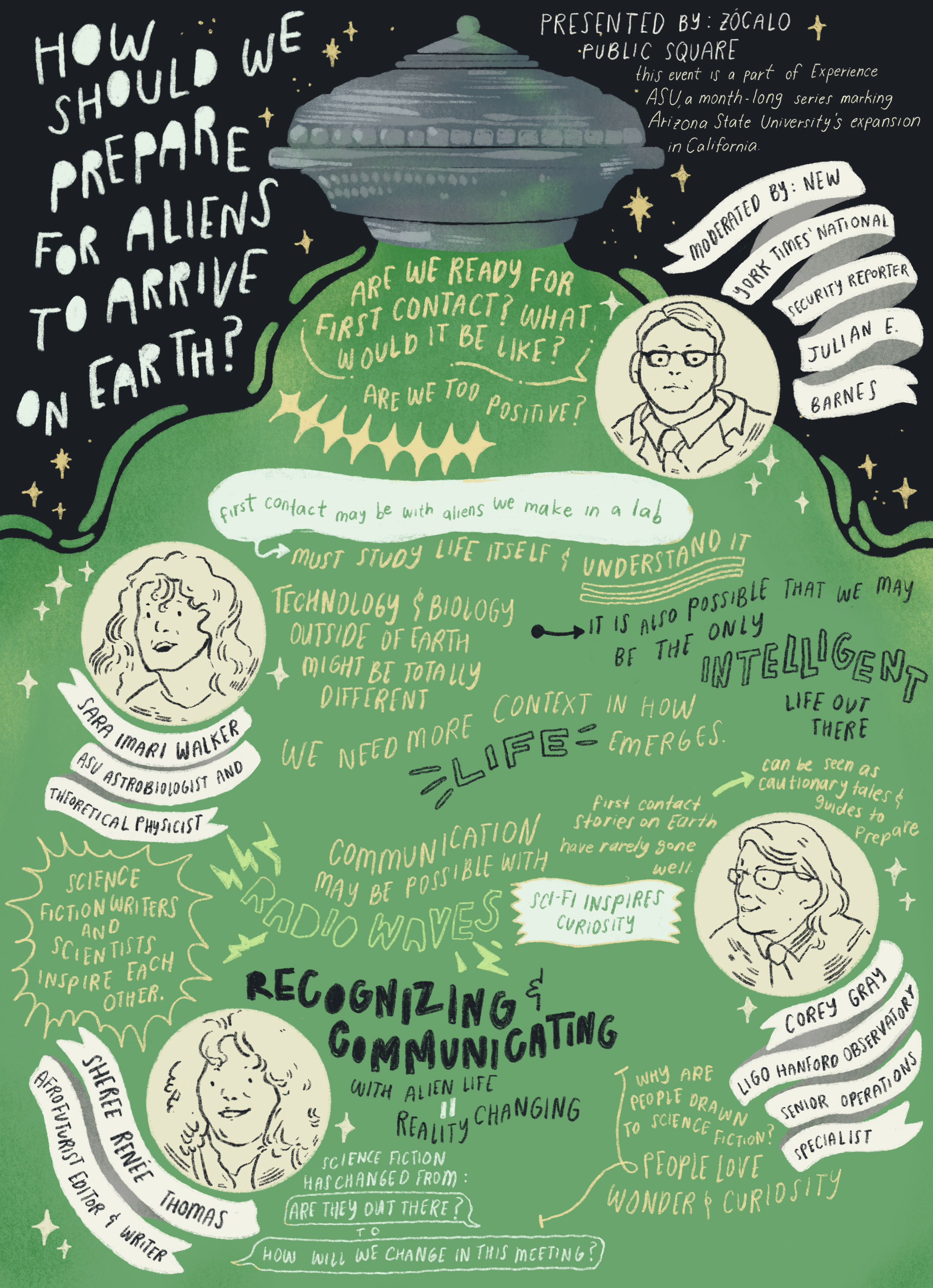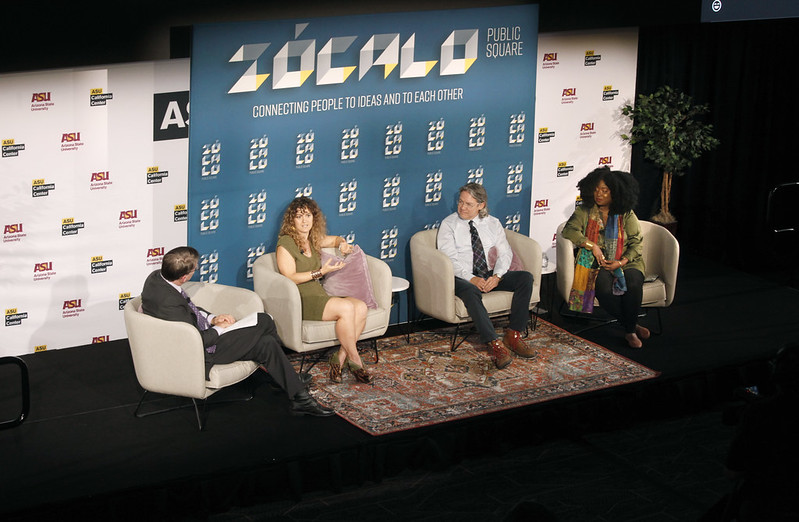
From left to right: Julian E. Barnes, Sara Imari Walker, Corey Gray, and Sheree Renée Thomas.
An “ineffable sense of wonder” filled last night’s Zócalo event, “How Should We Prepare for Aliens to Arrive on Earth?,” an event produced as part of Experience ASU, a month-long series marking Arizona State University’s expansion in California.
The panel did not debate whether or not alien life is “out there,” but rather adopted the premise in order to explore universal questions surrounding first contact. The conversation hit notes of optimism and despair, but all panelists agreed on some common refrains: that our imaginative strength is a vital source of inspiration for extraterrestrial exploration, that the alien arrival may present an opportunity to learn more about ourselves, and that humanity would need to come together in order to meet the moment.
The first question from New York Times national security reporter Julian E. Barnes, the evening’s moderator, cut to the chase: What would first contact be like—and would it go well or very, very badly?
Arizona State University astrobiologist and theoretical physicist Sara Imari Walker offered an entirely different scenario, one that requires a go-inward response. “I don’t think we’re going to discover alien life until we understand what life is,” she said. She believes first contact will be with aliens we make in a lab. We “need to build ‘planet simulators’ to simulate what life on other worlds would be like,” akin to the particle accelerators built to simulate the Big Bang, she said.
Physicist Corey Gray of LIGO Hanford Observatory, a member of the Siksika Nation (Northern Blackfoot) of Alberta, Canada, cited historical precedent: “Blackfoot people have had that experience of first contact and it didn’t go well for us.” He also brought up the film Arrival, based on Ted Chiang’s novella “Story of Your Life,” highlighting how difficult communication would be, and how hard it would be to recognize any signal from other life trying to make contact.
Afrofuturist writer Sheree Renée Thomas also brought up Chiang’s story, in addition to other fictional accounts, like Octavia Butler’s Dawn, that use first contact as a metaphor for terrestrial difficulties. “I think that first contact requires us to relate to each other differently than we do right now,” she said, which is “quite a challenge given our history.”
As they discussed the various facets of humanity that could obstruct a smooth and peaceful first contact, Barnes, the resident pessimist of the group—self-professed “more Scully than Mulder”—pushed on the point. If we were able to make contact with good aliens offering good technologies, could we even be trusted with it? Wouldn’t we make a mess?
Thomas sees promise in the stories science fiction tells: “Most sci-fi is moving past this concept of if they’re out there to how are we actually going to change in the meeting.” She hoped out loud that the aliens would not mimic the movies’ violent colonial alien forces—a projection, she says, of humans’ own colonial past. She hopes that aliens instead would have a deus ex machina effect on humankind. Whereas, it used to be “Y’all need Jesus!” she said, it’ll be “Y’all need aliens!” she added, to the audience’s delight.
Both Gray and Walker echoed her optimism. “Contact with alien life could be something that helps us and makes things better,” Gray said.
The conversation then moved from science fiction to science, with all the panelists agreeing that there is a strong synergy between the fields. Gray said sci-fi inspired a lot of his colleagues to work in science. He recounted a moment in his young adulthood when, after watching a movie, he and his friend went out to a remote area in the middle of the night, looked up at the sky, and screamed for the aliens to take them.
“Humans love a sense of wonder,” said Thomas. “We are deeply curious. But we also want to connect with something greater. We want to believe [that] in that darkness there is something.”
But, Barnes, asked: What if we’re alone?
Everyone agreed it was possible. “I definitely think sometimes we’re alone,” Thomas said. “I’m also one of those people that think it’s already here and it’s just moved on. […] Why would they need to engage with us?”
Barnes then, drawing on his reporting of Pentagon reports of “unidentified aerial phenomena,” took the opposite extreme: Is it more likely that they’re here and already watching us?
No, said Walker. “Why would aliens in our 4-billion-year history decide to visit the United States with rapid succession for the last 70 years?” she asked. “There’s just no consistent narrative there.”
Suggesting aliens exist presents narrative dangers, Barnes agreed. “Are we enabling conspiracy theories on Earth? How do we think and talk about these things in a way that doesn’t undermine our society and democracy, but solves the big questions of humanity?”
“That’s tough,” Thomas said. “You’re asking: How do we do something for humans and then have them not behave like humans?” Walker, in response, urged us to accept the limits of our knowledge: “I think it would be helpful if we could embrace the unknown as the unknown.”
The floor opened to audience questions, including a flurry from the very active online chat. One in-person audience member asked about the difference between “alien” and “extraterrestrial,” and what exactly “intelligent life” entails. Thomas and Walker both said these distinctions are cultural and even arbitrary. Ancient and indigenous knowledge recognizes non-human life as autonomous, sacred, and sentient, said Thomas. Walker noted that it’s a question of value: Many people may not value a microbe as they would a “little green man.”
As the discussion came to a close and the reception buzzed with a persistent curiosity (but no UFOs), it was evident that these far-reaching questions—with answers light years away—served as an opportunity to connect us Earthlings to one another, at least for one evening.






Send A Letter To the Editors